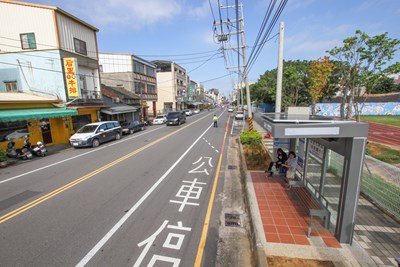
Mayor Lin inspected the solar power bus stop shelter on the 7th accompanied by Transportation Bureau Director I-chuan Wang. Legislator Tzu-yung Hung, City Councilors Mei-chun Weng and Pen-tien Chen also turned out for the event, while City Councilors Ching-fen Chang and Ching-lung Chen also sent representatives to pay their compliments. Director Wang briefed the dignitaries on the benefits of solar power bus stop shelters.
According to Mayor Lin, solar power bus stop shelters were unveiled in Taichung City last year. With 85 completed, Taichung City is currently ranked no. 1 in the country. Solar power bus stop shelters not only saves energy, reduces carbon emissions, they are also well-lit, safe and are able to bypass the difficulty of Taipower in supplying power, making them ideal for remote townships. Furthermore, the bus stop shelter is often used by the elderly people, women and children, thus building solar power bus stop shelters offer them with a safe place to wait for the bus in the rain or during nighttime.
“Development is not about large-scale constructions, it is imperative to begin by changing people’s lifestyle!” Mayor Lin pointed out that as a livable city, Taichung City will also be hosting the world flora expo in 2018, and hence the City Government will strive to create a green, livable city. The Mayor thanked Legislator Tzu-yung Hung for securing budget subsidy from the MOTC and several city councilors for their support. As one of the flora expo exhibition areas, solar power bus stop shelters and green transportation such as electric vehicles are set to become another feature of Houli. It is hoped that the successful experiences of Taichung City can be applied to other areas in Taiwan.
Mayor Lin appealed to businesses and the general public to donate solar power bus stop shelters to the City Government in order to materialize environmental protection and perform public service.
According to Legislator Tzu-yung Hung, the central government and municipalities are endeavoring to promote energy conservation, carbon reduction and green transportation; therefore she has kept in contact with MOTC and EPA since last year to secure related funding. She said she is glad to see Taichung City Government prioritizing the construction of solar power bus stop shelters, and she also expressed her gratitude to MOTC for allocating the necessary funding to facilitate the progress of the city government’s project. Preparatory work for the 2018 world flora expo is currently underway, and she also requested MOTC to subsidize electric buses in Taichung City; it is believed that with support from the government, green transportation development will be expedited to meet the public’s expectations and needs.
City Councilors Mei-chun Weng and Pen-tien Chen commended the city government for building solar power bus stop shelters, because they are the culmination of energy-saving and carbon-reducing technology which eliminates the hassle of power supply and allow the public to wait for bus in a safer, more convenient environment. They thanked the central government and municipality for their contributions, and they will continue to fully support the project.
According to the Transportation Bureau, thanks to Legislator Tzu-yung Hung’s efforts, a budget of NT$ 21.9 million was received from the central government for building bus stop shelters last year. This year, an additional NT$ 18.75 million was granted by the central government; so far, 547 bus stop shelters have been completed around the city, and the number is expected to surpass 600 by the end of the year.
This year’s bus stop shelter has two new features, namely “solar power application” and “reverse design”. Traditional bus stop shelters are unable to provide illumination after completion due to the lengthy waiting period for Taipower to supply electricity, in turn affecting the public’s safety, therefore the City Government invested NT$ 16 million to construct solar power bus stop shelters and lighting equipment in Heping, Dongshi, Houli, Taiping and Dali in order to improve the quality of the environment while waiting for bus, as well as resolve the problem of bus not stopping due to insufficient lighting.
In addition, after installing solar power equipment, 200 bus stop shelters can save approximately 0.28 million kWh of electricity every year, reducing carbon emission by about 151 tons. In the future, depending on the power generation efficiency of solar power, the Transportation Bureau will install dynamic bus information display to build a smart living city through energy conservation and carbon reduction.
The bus stop shelter’s “reverse design” eliminates the problem of unable to build a bus stop shelter within the limited space on the sidewalk. At a cost of NT$ 250,000 – 300,000 per unit, this is comparatively less than the cost of conventional bus stop shelters, which costs around NT$ 350,000 – NT$ 400,000, in turn saving budget. So far, 34 reverse bus stop shelters have been built citywide, and the number is expected to rise to 200 in the future.

 Facebook
Facebook
 Twitter
Twitter
 LINE
LINE